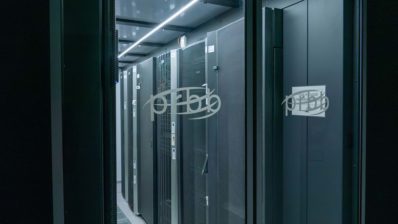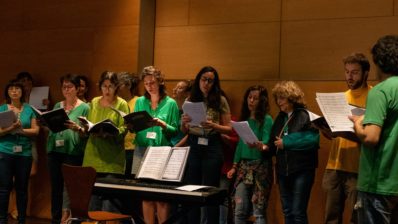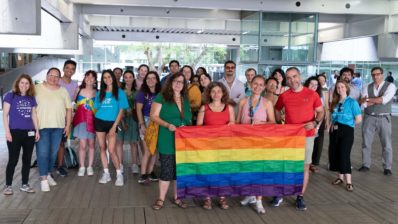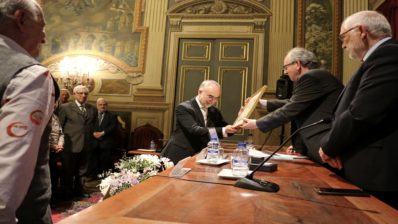Sustainability is one of the key values for the Barcelona Biomedical Research Park (PRBB). But in a building of 55,000m2, with more than 1,600 people and in which more than 13M kWh of electricity and more than 4M kWh of gas are used annually, the challenges are really big. Despite this, a lot of progress has been made on different fronts.
We review the recent history of sustainability at PRBB: what has been done, what is being done, and what remains to be done.
The PRBB is made up of six research centres that share one building. The management model is not very different from that of a community of neighbours: the Consorci PRBB is responsible, among other things, for maintaining the building, the common areas and managing some services such as the animal facility. For their part, the centres pay rent and their costs of electricity, gas, telephone, cleaning services, security, maintenance, etc.
In this way, the actions to improve the sustainability of the building are shared between two types; those that the Consorci PRBB can carry out at the infrastructure level, and those that fall on the centres themselves for they are due to their own research practice and the use of their laboratories.
What the PRBB has done and will do
Over the last 15 years, the PRBB has invested heavily in improving the energy efficiency of the building. There is currently a €25M Investment Master Plan until 2030, which aims to conserve the infrastructure, carry out actions focused on correcting construction errors and adapt the facilities to new scientific requirements and needs.
Some of the many actions carried out in recent years to improve the energy efficiency of the building, with the consequent savings in electricity, gas and water bills, have been:
- The replacement of lighting to LED in common areas, terraces and outdoors.
- The installation of twilight cells in the lighting in the lobbies.
- The modification of the building’s cooling circuit, saving 10% of the energy consumed in refrigeration.
- The elimination of the centralised sanitary hot water installation.
- The replacement of the hot water boilers for climatization with more modern technology and 15% more efficient boilers.
- The replacement of aerators in the bathroom taps.
- The installation to reuse the waste water from the Milipore filtration system in the laboratories for the toilets.
- The modification of the cooling system installation of the animal facility autoclave.
Since 2006, thanks to the investments and actions carried out in terms of energy efficiency in the building, the PRBB consumes 30% less electricity and 40% less natural gas.
Several other actions are planned for the coming years:
- Installation of photovoltaic panels on the roof of the building, which will lead to an expected saving of 5% of electricity consumption.
- Replacement with LED lighting throughout the building, with a saving of 6% of total electricity consumption.
- Replacement of the cooling plants (cooling production equipment).
- Replacement of high-voltage transformers.
- Progressive replacement of air-conditioning terminal equipment (more than 700 units).
Community engagement
But in order to have the least possible impact on the environment, it is necessary to work together. “The PRBB Consortium can make investments to improve the efficiency of the infrastructure, but the key is also to reduce energy demand – and this requires the collaboration of the whole community”, explains Mònica Rodríguez, from the PRBB’s communication department.
This joint commitment already existed years ago, when the Sustainable PRBB group was first established in 2014. This was the first working group with representatives from all the centres, many of them from the general services departments. Mònica was part of the group. “We did some things: for example, we created a waste manual and several awareness-raising campaigns, and we conducted a survey on mobility. That’s when we saw that a lot of people came to work by bike, which ended up in us putting bike racks around the building”, she recalls. Unfortunately, in 2017, the group disbanded.
Even so, both the centres and the PRBB continued to implement measures. “We knew that the centres were aware of this issue, and that they had sustainability policies within their institutions”, explains Mònica. “But each centre worked on sustainability ‘at home’ but the actions were not shared…”, she regrets.
In recent years, a sustainability grassroots group and an official Sustainability board have been created at the PRBB.
This changed with the emergence of the PRBB sustainability grassroots group, which appeared after the pandemic. This group, born from residents aware of the need to promote sustainability in research, aims to catalyse real changes. To this end, they meet, make joint requests to the centres and organise seminars – such as the one in July that led Mònica to explain the role of the PRBB in this.
“The truth is that it was thanks to the demands of this group, which asked for a sustainability agent in each centre, as well as greater transparency and support from the centres and the PRBB, that an official inter-centre working team was re-created in 2022: the PRBB sustainability board”, explains Mònica.
This board is made up of about 13 people: 6 from the grassroots group, 6 representatives from the six research centres and Mònica, representing the PRBB. “Now we are back to sharing ideas and common problems, promoting joint actions, etc.”. Mònica says that, despite the difficulties, in just one year they have managed to:
- Draw up a list of sustainable catering suppliers to share among all the centres.
- Raise the temperatures of the almost 200 freezers from -80 to -70ºC. Some centres had already started to test this and, despite hesitation, they have now all made the temperature change in their freezers.
- Create new recycling points for coffee capsules – something that seems like a small action, but is quite big considering the amount of coffee consumed by 1600 people!
- Collect ice packs. “A lot of ice packs arrive with the chemical and biological products, etc., and now we have managed to get CESPA to take them to the recycling plant. The ideal would be, rather than recycling them, to give them “a second life”, to reuse them, as was done during some time by donating them to the Banc d’Aliments. So far we haven’t been able to do it again, but we’re working on it”, says Mònica.
- Offer the option in vending machines of using your own cup, instead of a plastic cup.
Another thing that is now underway is a study by the UNESCO Chair on Life Cycle and Climate Change on the carbon footprint of the PRBB – some centres have already started to send out questionnaires to their staff. Linked to this, centres are reviewing, among other things, their sustainability policies for travel.
In addition, there are some individual initiatives, such as that done by Integra Therapeutics, a UPF spin-off located in the park, which has achieved an official sustainability certificate from My green lab.
Beyond the PRBB: networking
The PRBB is part of the Barcelona + Sostenible network – a City Council platform to which more than 1,000 local businesses belong, and which aims to promote the reuse of materials. “When we changed the telephone system in the building, we sent them more than 300 telephone terminals, which they gave to other companies. We also sent 10 TV screens, which they sent to different schools, and now that we have created the LabCafè and renovated the microwaves, we are also going to give away the old ones”, says Mònica.
Together with other leaders from the centres, Mònica also represents the PRBB in the SuRe network, in which people from different research centres in Catalonia meet monthly to network and share experiences in the field of sustainability in science. A website is currently being designed and its objectives are being worked on in order to open it up to more centres throughout the territory.
Navigating into the future
There is still much to be done. For example, the PRBB Sustainability Board is investigating the use of glass pipettes instead of plastic ones. Or talking to suppliers to see if cardboard boxes can be used instead of polystyrene, which is not recyclable. Or trying to do cross-departmental management between purchasing departments.
But beyond all this, says Mònica, what needs to be done is to switch mindsets in order to reduce energy demand. Because 70% of the more than 13Ms of Kw of electricity consumed per year at the PRBB are due to scientific activity, in the laboratories. So questions have to be asked about the processes that are used on a daily basis. Each laboratory should ask itself, is what I am doing necessary? Do I need 16 refrigerators or can I rationalise their use? Do I need to have equipment plugged in 24 hours a day?
70% of the more than 13Ms of Kw of electricity consumed per year at the PRBB is due to scientific activity
“You have to think that in the whole building we have more than 1,000 fridges and freezers”, explains Mònica. “For example, having a mobile phone charger plugged in all year round (even if unused) costs about €10/year. If just 500 chargers (out of the 1,600 people that work here) are left plugged, that is already €5,000 on the annual bill. And this is a simple mobile phone charger. If we look at the machinery and laboratory equipment, which are much more complex and expensive, you can’t even imagine… Every little action counts”, concludes Mònica.
For more information you can contact the Sustainability Board by sending an email to sostenibilitat@prbb.org.
If you are a PRBB resident and want to be part of the grassroot PRBB Sustainability group contact prbbsustainability@gmail.com.
Here you can watch Mònica Rodríguez’s seminar on the evolution of sustainability at PRBB: #PRBBSustainability Seminars: Evolution of sustainability at PRBB.







